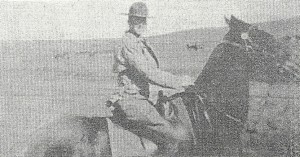By Regina Villiers. Originally published June 14, 2000 in The Suburban Life, added June 14, 2014.

Emery Gardner first served in the Cavalry in World War II before being put in the 9th Army and sent to the European Theater of Operations.
As people across the country arose on the morning of June 6, 1944, their radios sizzled and crackled with constant reports and news from the warfront in Europe. The allies had crossed the English Channel during the night and were invading Normandy, the coast of France. France had been overrun and was being controlled by the Germans.
On June 6, shortly after midnight, three divisions of airborne troops were dropped inland from the beaches to seize key points and to block the roads by which German reinforcements might arrive. Shortly after dawn the same day, five assault divisions from the American and the British Armies, under the supreme command of Gen. Dwight Eisenhower, drove ashore on the coast of Normandy.
All day long, wave after wave of troops stormed ashore along the Normandy beaches, to be met by German forces. The fiercest of the fighting was at Omaha beach where the attack was pinned down for several hours, but within 24 hours, the coastal wall had been breached. Germans could not launch a counterattack that could stop our forces, and a quarter of a million men had ben landed on those beaches. Many did not survive.
All my life, I’ve wondered what it must have been like to have been there that day, to have experienced the horror of D-day, to have faced death so close up.
Emery Gardener of Madeira knows. He was there. He has lived to tell about it. He came through it “without a scratch.”
“Well, it was scary, of course,” Emery says. “But you just faced up to the moment. The average soldier didn’t know what was behind the scene in front of his eyes. You didn’t know what you were coming up against.”
D-day was not the only battle Emery survived without a scratch. Among his medals are the American Campaign Medal and the European Campaign Medal, with five battle stars.
Emery was a part of the American 9th Army. After D-day and the liberation of France, they went on toward Berlin. Emery was also at Bastogne and the Battle of the Bulge in Belgium.
The American 9th and the American 3rd Armies headed on toward the Rhineland and then to Berlin. Within a month, they had cleared the Germans from the Rhineland and reached the Rhine on March 2, 1945.
“We were the first to cross the Rhine,” Emery says of the 9th Army.
Then they went on to Berlin where Emery was a part of the Allied victory and the surrender of Germany to end World War II in Europe.
Eventually, he was sent back to Boston and then to North Carolina, for regrouping. After going through the war unscathed, he spent a 30-day-furlough in a hospital getting a cyst removed.
He came out of the Army at Camp Atterbury on March 8, 1946.
He had gone into the Army Jan. 19, 1942, at Fort Thomas, Ky., barely over a month after Pearl Harbor. From there, he was sent to Ft. Riley, Kan., for basic training in the Second Cavalry, the “hors cavalry.” He then went on border patrol for about nine months in Arizona.
When they did away with the cavalry, he was sent for basic training all over again, this time with the 9th Army Medical Battalion, which eventually landed him overseas in the European Theater of Operations.
In the 9th Army, he learned to cook and became a cook. To this day he likes to cook and does. “Thank goodness!” his wife Wanda said. She’s happy to let him.
Emery and Wanda did not meet until after the war. Then they got married and moved to Madeira where they have lived ever since. They are a familiar sight at various civic gatherings, and they are stalwart members of the Madeira Historical Society. At every meeting and every work session, Emery and Wanda are there, doing their time.
They have a son, Dwight. He and his wife, Mary, and their two sons, Brian and Kevin, live in Columbia, S.C., where Dwight works at the University of South Carolina.
When asked to produce photos of himself made during WWII, Emery brought me five of him in uniform in various locations and one on a horse while in the 2nd Calvary.
“Emery,” I said, “I need pictures of you. These are pictures of Errol Flynn, the old-time, swash-buckling movie star.”
But he assured me they were indeed photographs of him, and when I asked him if people commented on his close resemblance to Errol Flynn back then, he modestly replied, “Only Wanda. She thought I looked like him.”
“He did look just like Errol Flynn,” Wanda said. “He was so good looking. That’s why I snatched him up and held onto him.”
It has been 56 years since D-day. Fifty-six years. More than a lifetime ago, yet the horror of it still seems vivid.
Emery Gardner remembers it all. But when he thinks about it now, he just feels fortunate. “I was so lucky,” he said.